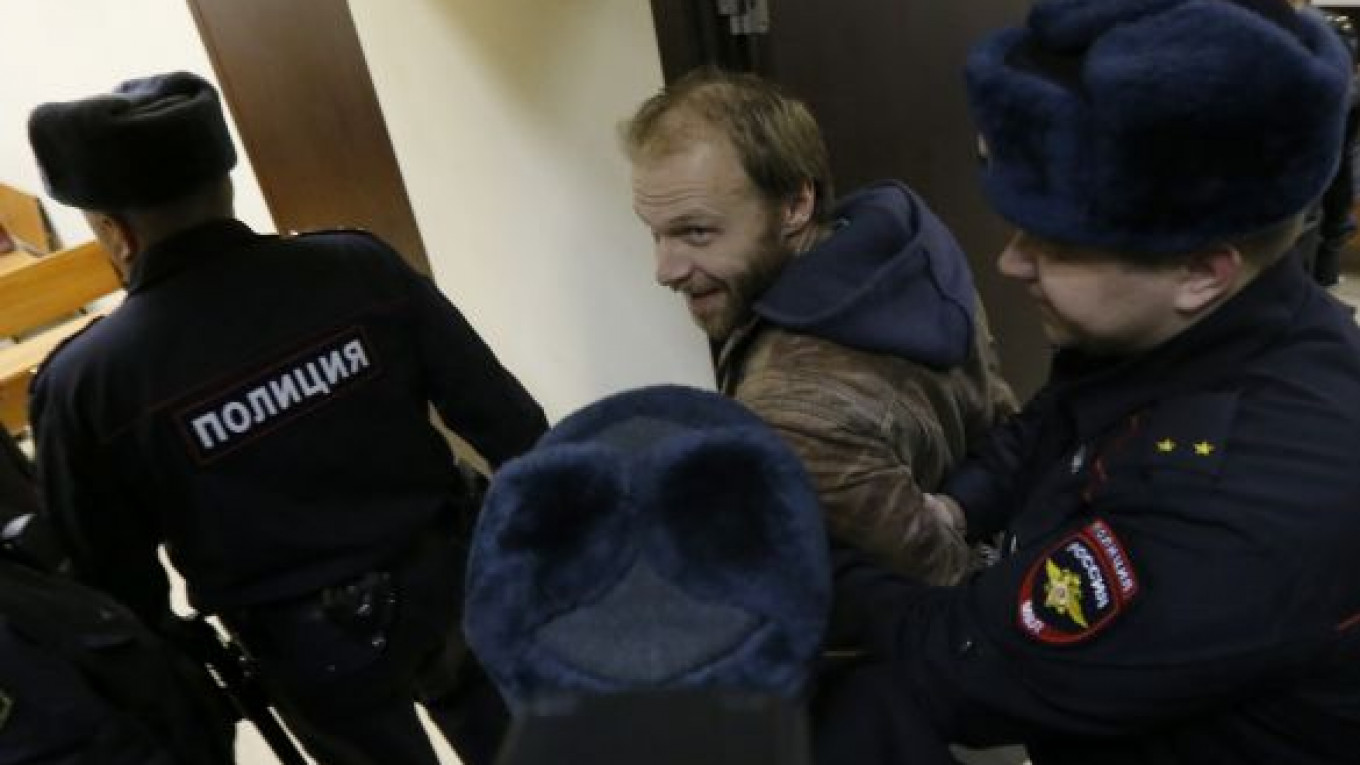Freelance photographer Denis Sinyakov has worked in war zones around the world, from Afghanistan to South Ossetia to Israel. He never expected that being a crew member on a Greenpeace ship would be more dangerous than being in the center of an armed conflict.
Sinyakov spent almost two months in jail along with 29 other crew members of the Arctic Sunrise ship in the northern port of Murmansk, after activists tried to put a Greenpeace banner on the Prirazlomnaya offshore oil platform, owned by state-run energy giant Gazprom Neft, in the Pechora Sea on Sept. 18. The stunt was meant to protest oil drilling in the Arctic.
"The way it turned out came as a surprise to me, but I do not regret anything," Sinyakov said in an interview at a Moscow cafe. "The time spent in prison allowed me to get rid of many illusions. I realized who my real friends are and what the modern Russia is in reality."
Sinyakov was on assignment for Russian news website Lenta.ru and several foreign magazines while on board the Arctic Sunrise but was charged with piracy along with other crew members.
In October, the Investigative Committee replaced the piracy charges with hooliganism for all 30 people, reducing the maximum punishment that the defendants face to a seven-year prison sentence, instead of piracy's 15-year term. Earlier this month, a court in St. Petersburg, where the crew was moved from Murmansk, ruled to release them all on bail, with the last person released on Thursday.
Sinyakov said the prison conditions were not the most difficult thing for him but rather the behavior of prison guards, who he said treated everyone as criminals. If at first the situation seemed unusual and even interesting, especially for the foreign activists, it soon began to frustrate everyone, he said.
"The cells were tiny, the food awful, and it was very cold, but that was nothing compared to the psychological pressure that I felt all the time while being there. Prison guards do not understand that a court may find someone innocent, so they treat everyone with equal derogation," he said.
There was no calendar in the prison, nor watches, he said. He found out news mostly from human rights activists who came on visits to the prison and relayed it to the foreign Greenpeace activists.
"All of us were put in different cells, but when we were taken for walks we could talk to each other through a concrete wall that separated different outside zones," he said. "One of us always asked: 'Hey pirates, is anybody here?'"
As every new day looked exactly like the previous one, Sinyakov turned to books and started to read Soviet dissident writers who wrote about prison issues in their books, such as Alexander Solzhenitsyn, and came to the bleak conclusion that Russian prisons have not changed in 50 years.
"I had been to several Russian prisons on assignment, so I had some idea of what they are like, but it turned out that all I was allowed to see were the best Russian prisons, while in reality most prisoners are kept in much worse conditions," he said.
But that was not the main discovery he made in jail. He was surprised most of all by people reacting to his arrest, gaining unexpected support from those he had not seen for a long time and not receiving it from some of his former employers.
"My wife, who came to visit me in prison, also amazed me by her firmness and support," he said. "I wanted to insulate her from all this — I did not want her to come to Murmansk and see the prison atmosphere and dead birds stuck in barbed wire. But she did come. In some sense, I fell in love with her all over again during this time."
His 3-year-old son, Vasya, waited for him in Moscow, while Sinyakov wrote fairy tales for him trying to explain what had happened.
He said that other prisoners supported the Arctic Sunrise crew, who said they thought that jail was not a suitable place for Greenpeace activists, while his cellmates in Murmansk taught him how to use prison facilities, and a cellmate in St. Petersburg helped him prepare a speech for a court hearing.
Even though he sees his release on bail as a great victory, he said he is still worried that he could be put back behind bars.
"I talked to several journalists who have access to top government bodies, and they told me our release on bail is just a 'comma' in this case and not a final 'period,'" he said.
Contact the author at [email protected]
A Message from The Moscow Times:
Dear readers,
We are facing unprecedented challenges. Russia's Prosecutor General's Office has designated The Moscow Times as an "undesirable" organization, criminalizing our work and putting our staff at risk of prosecution. This follows our earlier unjust labeling as a "foreign agent."
These actions are direct attempts to silence independent journalism in Russia. The authorities claim our work "discredits the decisions of the Russian leadership." We see things differently: we strive to provide accurate, unbiased reporting on Russia.
We, the journalists of The Moscow Times, refuse to be silenced. But to continue our work, we need your help.
Your support, no matter how small, makes a world of difference. If you can, please support us monthly starting from just $2. It's quick to set up, and every contribution makes a significant impact.
By supporting The Moscow Times, you're defending open, independent journalism in the face of repression. Thank you for standing with us.
Remind me later.






